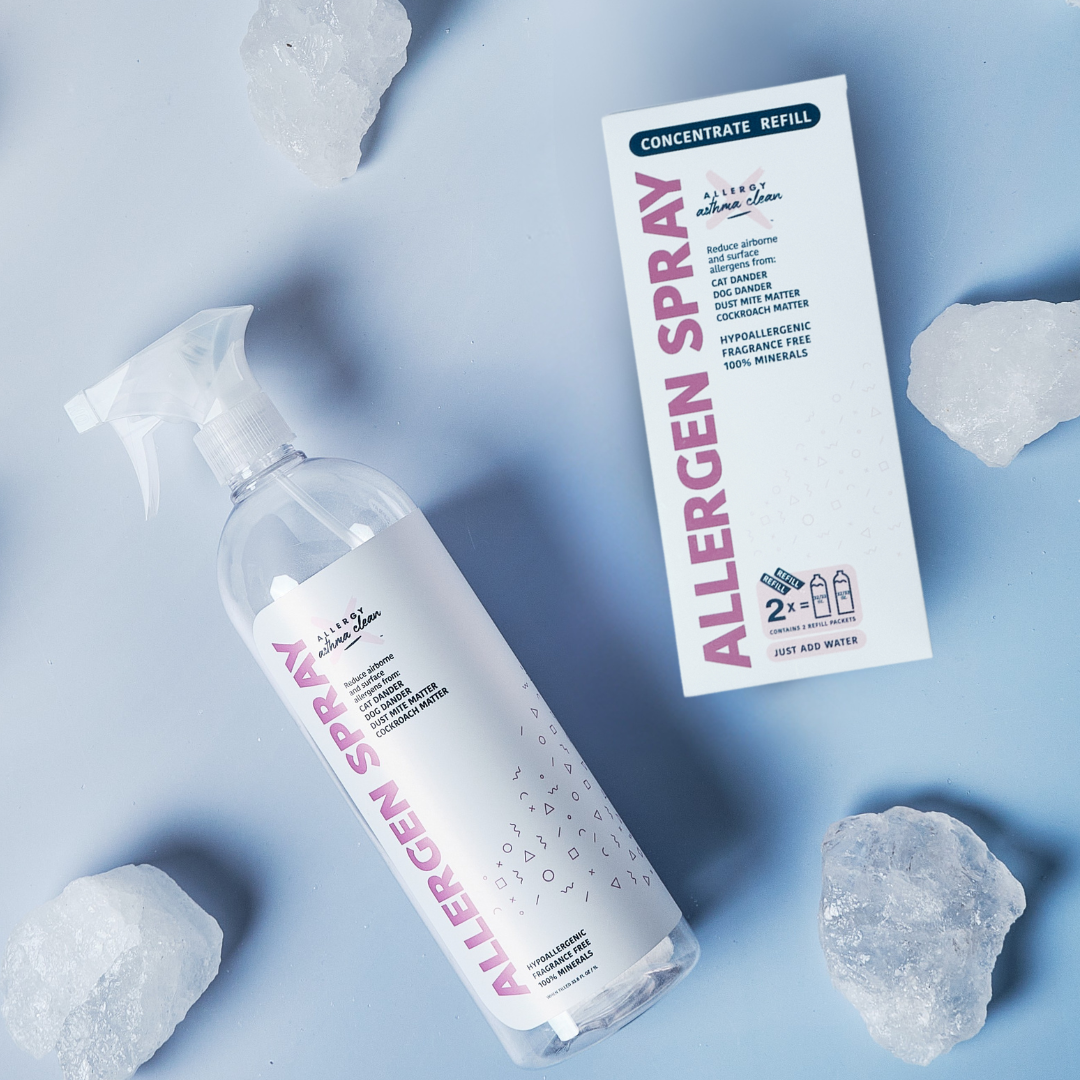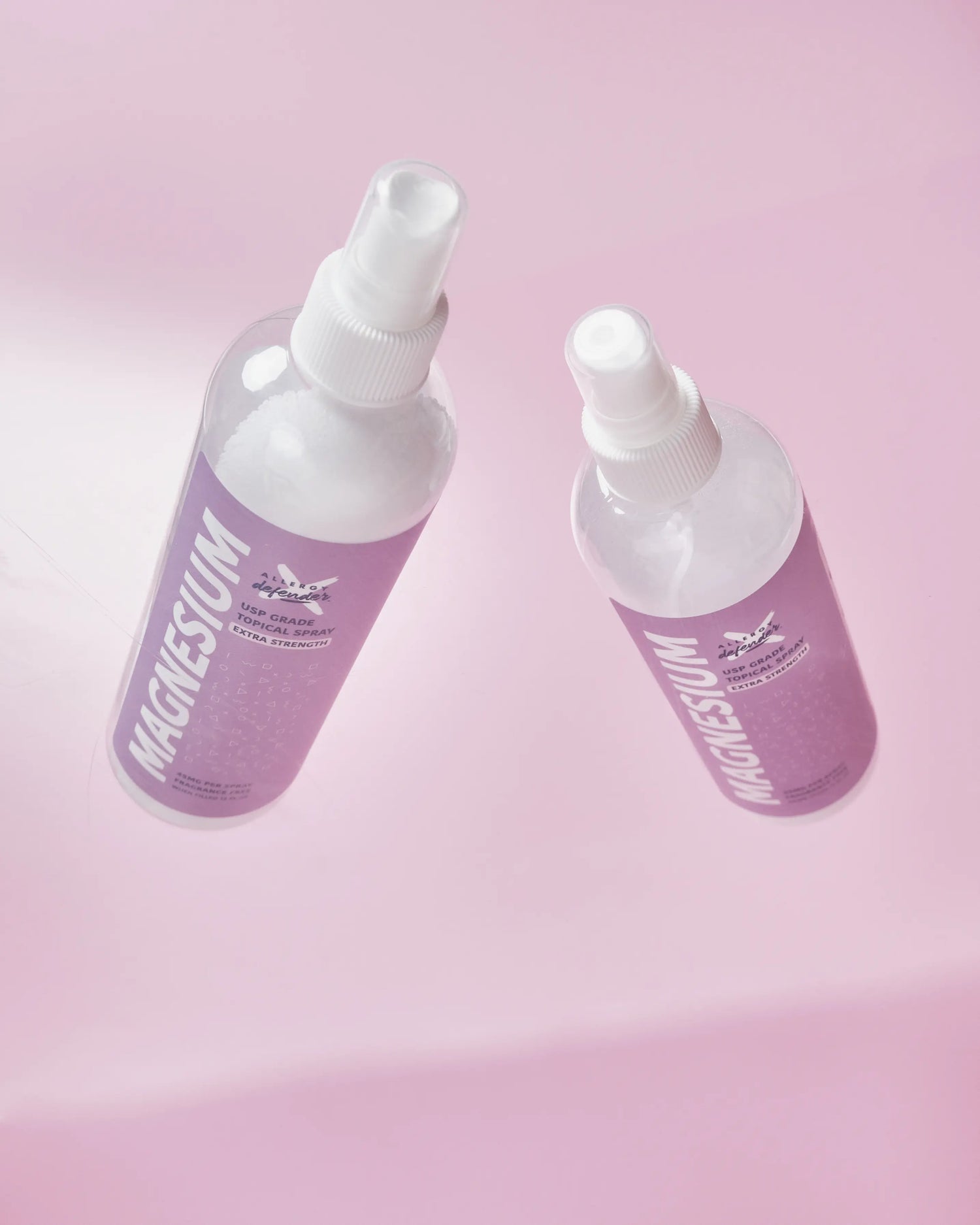Surviving the Holidays: Visiting Family with a Pet Allergy
Pet allergies (triggered by proteins in dander, saliva, urine) cause sneezing, coughing, itchy watery eyes, congestion, skin rashes, and potentially asthma attacks during family visits. Preparation includes communicating allergies in advance, designating pet-free zones, vacuuming with HEPA filters, using Allergy Asthma Clean Allergen Spray by Allergy Defender throughout the house, washing bedding in hot water, and removing rugs. During visits, maintain medication regimen, wash hands frequently, avoid touching face, shower before entering safe zones, take fresh air breaks, and consider wearing masks for severe allergies.
Key Takeaways:
- Pet allergens from multiple sources – proteins in dander, saliva, urine trigger immune responses causing mild to severe symptoms including potential asthma attacks
- Pre-visit communication essential – discuss allergy severity with family, collaborate on pet-free areas, consider hotel alternatives if needed for severe allergies
- Deep cleaning before arrival – vacuum with HEPA filters, use Allergy Asthma Clean Allergen Spray by Allergy Defender in air and on surfaces, wash bedding in hot water
- Create designated safe zones – establish pet-free bedroom/guest room, remove rugs (trap allergens), contain or board pets during visit
- Hygiene protocol during stay – wash hands frequently, avoid touching face/eyes, remove clothes before entering safe zones, shower and wet hair before bed
- Fresh air breaks provide relief – step outside periodically for symptom relief, open windows for ventilation to reduce indoor allergen levels when weather permits
As the holiday season approaches, there's a sense of anticipation, isn't there? Delicious food, enticing aromas, and heartfelt reunions with loved ones make this time of year truly special. However, for those battling pet allergies, the excitement of visiting family can be accompanied by a twinge of apprehension. Why? Because navigating through a house filled with allergens can dampen your spirits and bring forth worries about symptoms and discomfort.
Believe me, I understand the struggle all too well. As someone who grapples with pet allergies, I've experienced firsthand challenges regarding family visits during the holiday season. But fear not; here are some strategies and helpful tips to survive and enjoy the holidays.
1.) Understand Pet Allergies
Specific proteins in pet dander, saliva, urine, and other bodily fluids trigger pet allergies. While cats and dogs are the most common culprits, other animals, like birds, rabbits, and rodents, can also cause allergies. When a person with a pet allergy comes into contact with these allergens, their immune system reacts abnormally, perceiving them as harmful substances. This immune response can lead to various symptoms, from mild to severe.
Typical symptoms include sneezing, coughing, itching, watery eyes, nasal congestion, and skin rashes. Individuals may experience difficulty breathing, wheezing, or even an asthma attack in more severe cases. Wheezing around my family's dogs was a genuine concern for me because it usually brought on asthma.
2.) Prepare for Your Visit
Take Proactive Steps
A. Communicate with your family if they are unaware of your allergies
- Before your visit, have an open and honest conversation with your family about your pet allergy. Communicate the nature of your allergy, its symptoms, and the potential triggers. Knowing this information will help n make family and friends want to accommodate you.
- Discuss potential living quarters: Collaborate with your family to determine how best to adapt to your needs. Ask if they can make certain areas of the house pet-free or limit pet access during your stay. Additionally, discuss any specific cleaning or preparation measures they can take to minimize allergens. We did this in our family. When I was younger, I stayed in an upstairs bedroom when my allergies worsened. Another option my parents looked into was staying in a nearby hotel.
B. Research the pet situation in the home
- If staying with friends, ask if they have pets. This will help you mentally prepare and take appropriate precautions.
- Learn about the type of pets and their habits: Find out pet's behavior patterns and typical areas of the house they frequent.
The goal? To establish a pet allergy-free environment that works for you.
Minimize Allergens
Another topic of conversation with your family should be about cleanliness. Again, addressing your symptoms and the severity of your allergies will help them understand you need a clean house! If this is a touchy subject (after all, people think their homes are clean), print this article and hand them this guide for tips on how to clean up.
Clean and Prepare Before Your Loved Ones Arrive
- Vacuum the house thoroughly: If you have a high-quality vacuum cleaner with a HEPA filter, use it to remove pet dander and other allergens from carpets, rugs, upholstery, and floors. Change the bag and vacuum, even if you have a regular vacuum.
- Use Allergen Spray: Allergen Spray can be a valuable tool in reducing pet allergens in the air and on surfaces. These sprays help neutralize and break down allergens, rendering them inactive. Spray the house before your family member arrives. Or simply spray and walk away.
- Wash bedding and fabrics: Launder all bedding, including sheets, pillowcases, and blankets, in hot water to eliminate pet allergens. Use Allergen Spray on curtains if they can't be washed, too.
Create Allergy-Free Zones
- Establish a pet-free area in the house: Designate specific areas as pet-free or safe zones. This can be a bedroom, a guest room, or any other space where your loved one can retreat to minimize exposure to allergens.
- Remove rugs: Carpets and rugs tend to trap and hold allergens, making them challenging to eliminate. Temporarily remove or minimize the presence of rugs in the areas where they'll spend the most time.
- Keep pets contained: Put Fluffy or Fido in another room: If that's impossible, consider boarding your pets.
During Your Stay
Tips just for you to manage allergies during your visit:
A. Manage Symptoms
- Carry necessary medications and treatments: Ensure your prescribed allergy medications, such as antihistamines or nasal sprays, are readily available. Be consistent with your medication regimen to help control symptoms and alleviate discomfort.
- Use Allergen Spray: Before and during your visit is a perfect time to use Allergen Spray. Spray freely throughout the house, paying particular attention to spraying in the air. Spray and walk away for about 10 minutes.
- Consider wearing a mask: We know it's a pain, but it does work to keep pet dander away from your face.
B. Hygiene
- Frequent handwashing minimizes contact with allergens: Wash your hands regularly, especially after touching pets or surfaces that may have allergens. This helps prevent them from transferring from your hands to your face, reducing the risk of triggering symptoms.
- Keep your hands away from your face: Minimize contact with your face and avoid touching your eyes to reduce irritation.
- Reduce pet allergens in the allergy-free zone: If you stay in your family's home, remove your clothes before entering the safe zone. This simple step helps reduce pet allergens in the bedroom. Why? Because pet allergens cling to your clothes!
- Take a shower: Shower before entering the safe zone, and if possible, wet your hair. Towel dry. This alone helps reduce the transfer of pet dander via your hair to your pillow.
C. Seek Fresh Air Breaks
- Take breaks outside: Step outside to get some fresh air. This can temporarily relieve symptoms and allow you to rejuvenate before returning indoors.
- Open windows for ventilation: If weather permits and your family is comfortable, consider opening windows. Fresh air circulation helps reduce indoor allergen levels so you can relax.
Allergen Spray can be an excellent source for reducing pet allergens in the air and on surfaces during your visit. I, co-founder of Allergy Defender, rely on Allergen Spray when visiting my family because I have severe pet allergies. It's pretty effective, so I can stay for a few hours or overnight without experiencing any allergy-related problems.
Throughout this blog post, we've explored the importance of understanding pet allergies and the role of allergens in triggering symptoms. We've discussed strategies for preparing for your visit, minimizing allergens, and managing symptoms effectively. By implementing these tips, you can create an environment that promotes your well-being. After all, you are ultimately responsible for your health.
I wish you a holiday season filled with love, joy, and memorable family gatherings. Stay positive, take care of yourself, and savor the special moments this time of year brings.



